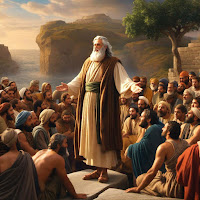Noah the Evangelizer
“I am establishing my covenant with you, and you must go into the ark, you, your sons, your wife, and your sons’ wives with you.”—Thus instructs God to Noah in Genesis 6:18.
But were any others to join them, to be saved from the impending cataclysmic deluge? There is nothing really suggesting that others were to join them. In fact, at Genesis 7:1 God tells Noah: “Go into the ark, you and all your household, because you are the one I have found to be righteous before me among this generation.” In other words, God did not add, “and anyone else who listened to your preaching of salvation.” It is not even hinted at. This is also seen in Hebrews 11:7, which states that Noah’s ark was “for the saving of his household,” and that “through this faith he condemned the world.” In fact, while Jesus mentioned Noah and the ark, he stopped short of saying that Noah was an evangelist. He just said Noah’s contemporaries ignored his activities, which at the very least was building the ark and loading it.—Matthew 24:37-39; Luke 17:26, 27.
However, 2 Peter 2:5 calls Noah “a preacher of righteousness.” A reasonable assumption is then made that he was a preacher of salvation, urging others to join him on the ark. Since none did, another reasonable assumption is made that his audience refused his invitation and therefore must have mocked him.
These are reasonable assumptions that make perfect sense. Indeed, the idea that no others were warned is horrifying. The problem is that they are still assumptions that are not directly stated in the Deluge narratives.
But where did Peter get the information that Noah was “a preacher of righteousness”? Before we appeal to divine inspiration, that God directly beamed that information into Peter’s brain, we would be wise to first look at Peter’s textual context. Is there anything in his textual world that said anything about this? It turns out that there was indeed an important text he may have been drawing from—the Sibylline Oracles. These originally were Jewish texts pretending to be oracles uttered by pagan sibyls to a Gentile audience. Interestingly, Book 1:154-164 from this collection states:
Single among all men, most just [upright] and true, 155 Was the most faithful Noah, full of care 156 For noblest works. And to him God himself 157 From heaven thus spoke: “Noah, be of good cheer 158 In thyself and to all the people preach 159 Repentance, so that they may all be saved. 160 But if, with shameless soul, they heed me not 161 The whole race I will utterly destroy 162 With mighty floods of waters.[1]So this text is the first occurrence where this association is made, of God commanding Noah to preach salvation to others to join them on the ark, and that this was noble or righteous. Evidently this text was popular among Peter’s contemporaries, for him to be able to casually draw from it. Could it have been a common source that Peter and the Sibylline Oracles were drawing from though? Unfortunately, there is no evidence for that. The Sibylline Oracles is the earliest known occurrence of this addition to Noah.
Did anyone else, like a contemporary of Peter, also apparently draw from this text? Yes, the Jewish historian Josephus—who was also familiar with the Sibylline Oracles.[2] He wrote in Antiquities of the Jews 1.3.1:
But Noah was very uneasy at what they did: and being displeased at their conduct, persuaded them to change their dispositions, and their actions for the better. But seeing they did not yield to him, but were slaves to their wicked pleasures, he was afraid they would kill him, together with his wife and children, and those they had married.Thus, if he did draw from that text that Noah was an evangelist, he added an assumption that their inaction went beyond merely mocking and turned into threats, and thus Noah feared for his life.
So, at the very least, we have some options on the table. We can claim that Peter was divinely inspired to know that Noah was a preacher of righteousness, or we can claim he was drawing from his textual milieu.
Even centuries later, around 500 CE, the Rabbinic work Genesis Rabbah 30:7 said:
The Holy One, blessed be He, said: “One herald arose for me in the generation of the Flood, Noah.”Then it is stated that the response from his audience was “contempt” and “they despised him and called him, ‘Contemptible old man!’”
Similarly, around the same time as the Genesis Rabbah was written, the Babylonian Talmud in its tractate Sanhderin 108a stated that:
Noah the righteous would rebuke the people of his generation and say to them: “Repent. And if you do not, the Holy One, Blessed be He, will bring a flood upon you and float your corpses on the water like wineskins filled with air that float on water.”In conclusion: the notion that Noah was a preacher, an antediluvian evangelist, appears to come from Jewish tradition—and the resulting notion that, since none joined his family, he was mocked, also comes from later Jewish commentary.[3]
Footnotes:
[1] This is numbered 125-131 in The Old Testament Pseudepigrapha edited by James Charlesworth, Vol. 1, p. 338.
[2] For instance, Josephus quoted the Sibylline Oracles in Antiquities of the Jews when discussing an alleged Tower of Babel legend in Book 1, chapter 4, section 3. See: Corroborating Babel jimspace3000.blogspot.com/2014/02/corroborating-babel-whole-earth-had.html
[3] These references are cited in the Intertextual Bible website: intertextual.bible/book/2-peter/chapter/2
Labels: Bible


